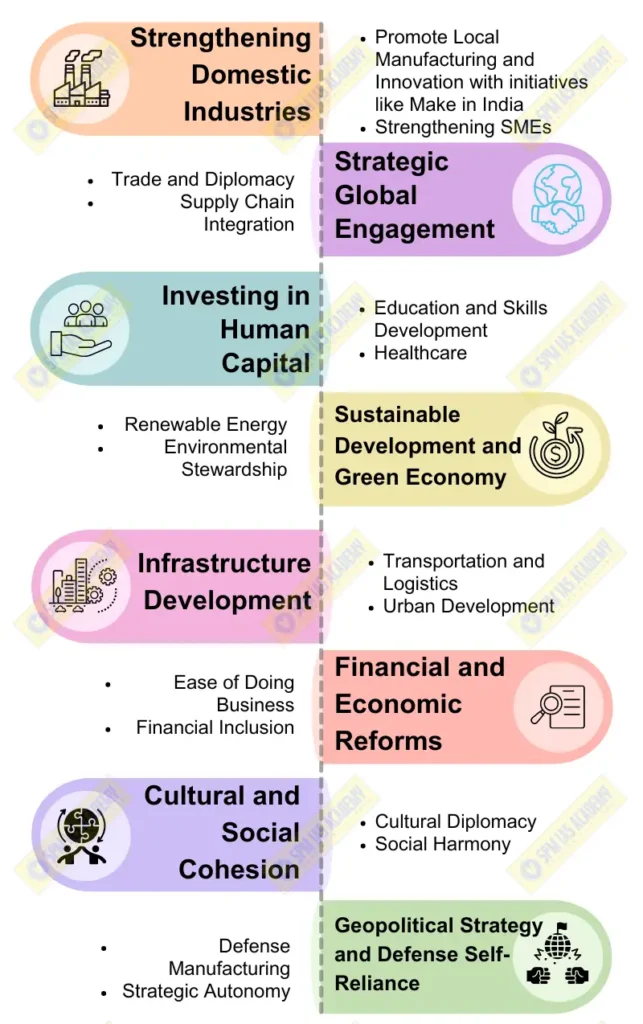India’s pursuit of self-reliance and national development in the context of a globalized world requires a multifaceted approach that balances internal capacities with strategic global integration. This vision is embodied in the Atmanirbhar Bharat Abhiyan (Self-Reliant India Mission), which aims to make India a major player on the global stage while ensuring robust domestic growth.
1. Strengthening Domestic Industries
- Local Manufacturing and Innovation: A core component of self-reliance is the enhancement of domestic manufacturing capabilities. Initiatives like Make in India focus on sectors such as electronics, automobiles, defense, and pharmaceuticals, aiming to reduce import dependency and position India as a global manufacturing hub. By nurturing innovation ecosystems, India can drive technological advancements and
produce value-added goods. - Small and Medium Enterprises (SMEs): Strengthening SMEs through financial support, technology upgrades, and easier regulatory processes is critical, as these enterprises form the backbone of India’s economy and play a significant role in job creation.
2. Strategic Global Engagement
- Trade and Diplomacy: In a globalized world, India must maintain and enhance its trade relationships while negotiating favorable terms in international agreements. This involves engaging in multilateral platforms like the WTO, BRICS, and G20 to advocate for a fair global trade system that benefits emerging economies.
- Supply Chain Integration: India should seek to integrate into global supply chains, not just as a supplier of raw materials but as a provider of finished goods and services. Strategic partnerships, such as those within the Quad (United States, Japan, Australia, and India), can help India secure its position in critical sectors like technology and defense.
3. Investing in Human Capital
- Education and Skills Development: For India to be self-reliant, it must develop a highly skilled workforce capable of driving economic growth and innovation. This requires significant investment in education, vocational training, and continuous skill development. The National Education Policy 2020 is a step in this direction, emphasizing critical thinking, creativity, and technical expertise.
- Healthcare: A healthy population is essential for sustained national development. Strengthening the healthcare infrastructure, increasing accessibility to healthcare services, and investing in research and development in the pharmaceutical sector are crucial for ensuring a productive workforce.
4. Fostering Technological and Digital Transformation
- Digital India: The Digital India initiative aims to transform India into a digitally empowered society and knowledge economy. Expanding digital infrastructure, promoting digital literacy, and encouraging innovation in areas such as artificial intelligence, blockchain, and the Internet of Things (IoT) are vital for self-reliance.
- Indigenous Technologies: Developing indigenous technologies, particularly in critical sectors like defense,
space, and energy, will reduce dependency on foreign technologies and bolster India’s strategic autonomy.
5. Sustainable Development and Green Economy
- Renewable Energy: Achieving self-reliance also involves transitioning to a sustainable development model. India’s commitment to expanding renewable energy capacities, particularly solar and wind, not only addresses environmental concerns but also reduces dependence on imported fossil fuels.
- Environmental Stewardship: Sustainable agricultural practices, water conservation, and biodiversity protection are crucial for ensuring long-term national development that aligns with global environmental goals.
6. Infrastructure Development
- Transportation and Logistics: Modernizing infrastructure, including transportation networks, ports, and logistics, is essential for enhancing domestic connectivity and facilitating global trade. Initiatives like Bharatmala and Sagarmala aim to improve road and port infrastructure, respectively, thereby boosting economic activity and integrating India more effectively into global trade routes.
- Urban Development: Smart cities and urban renewal projects focus on creating sustainable and resilient urban spaces, which are critical for accommodating India’s rapidly growing population and urbanization.
7. Financial and Economic Reforms
- Ease of Doing Business: Continued reforms to improve the ease of doing business in India, such as simplifying regulations, enhancing transparency, and ensuring policy stability, are vital to attract both domestic and foreign investments.
- Financial Inclusion: Strengthening financial inclusion through initiatives like Jan Dhan Yojana and expanding access to credit for underserved sectors can spur economic growth and development at the grassroots level.
8. Cultural and Social Cohesion
- Cultural Diplomacy: Promoting India’s rich cultural heritage globally not only enhances its soft power but also opens avenues for economic engagement through tourism and cultural exchanges.
- Social Harmony: Ensuring social cohesion and addressing inequalities is critical for internal stability, which in turn supports national development. Programs that focus on inclusive growth, such as Skill India and Startup India, aim to empower marginalized communities and promote entrepreneurship across all sections of society.
9. Geopolitical Strategy and Defense Self-Reliance
- Defense Manufacturing: Self-reliance in defense manufacturing is a strategic priority. India is focusing on developing indigenous defense technologies and reducing dependency on foreign arms. The Defense Production and Export Promotion Policy (DPEPP) aims to enhance self-reliance and boost defense exports.
- Strategic Autonomy: In the geopolitical arena, India’s strategy involves balancing relations with major powers while maintaining strategic autonomy. This involves leveraging partnerships for technological and defense cooperation while ensuring that India’s core national interests are not compromised.
India’s journey toward self-reliance and national development in a globalized world is a complex but achievable goal. It requires a synergistic approach that strengthens domestic capabilities while embracing global integration. By focusing on innovation, sustainability, human capital, and strategic global partnerships, India can not only achieve self-reliance but also emerge as a significant global power, contributing to and benefiting from the interconnected global economy.
Check out UPSC Coaching Centre Guwahati | APSC Coaching Centre Guwahati | Crack APSC Exam | UPSC Civil Services Exam | Ethics Paper in UPSC Exams













